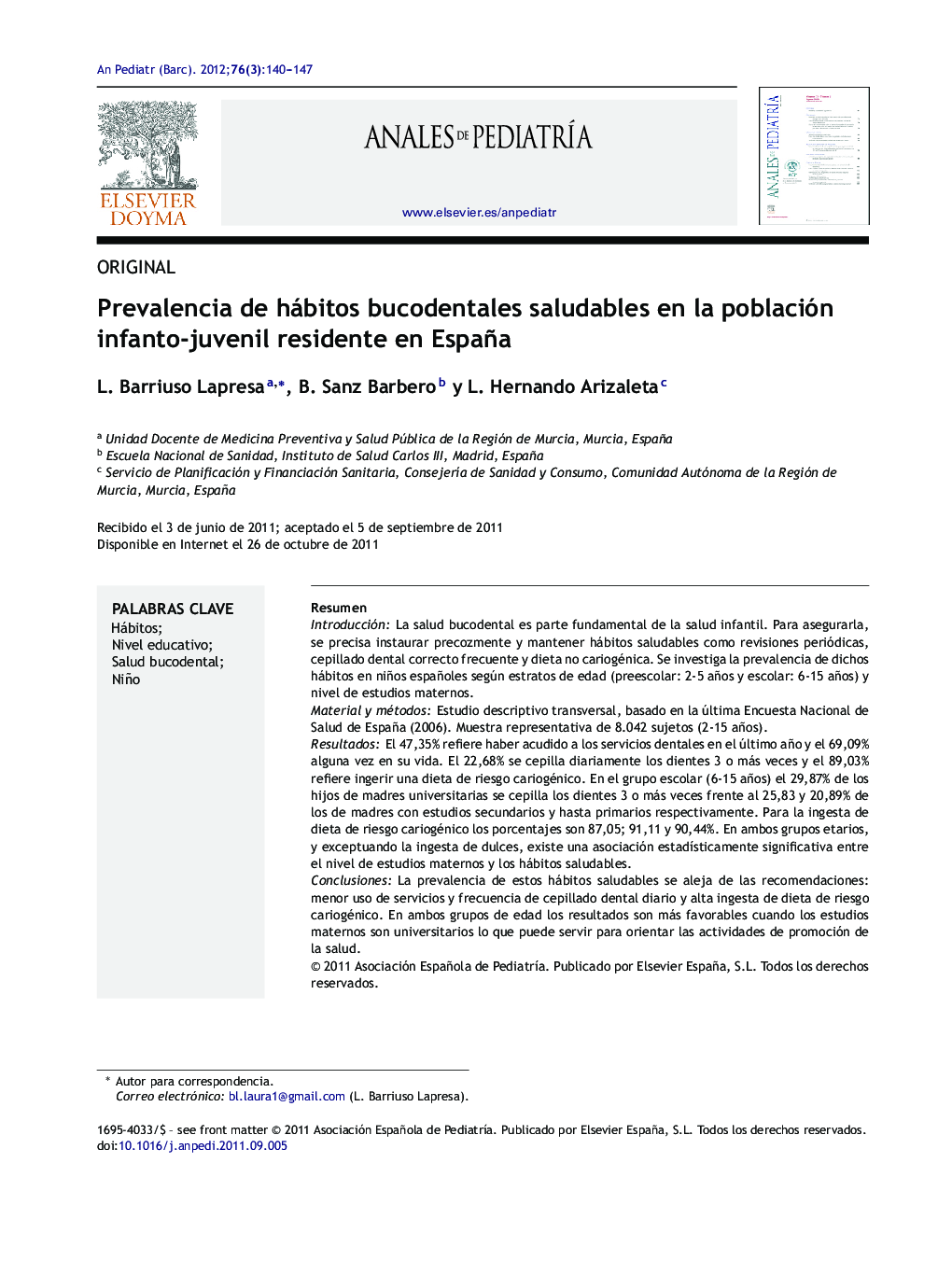| کد مقاله | کد نشریه | سال انتشار | مقاله انگلیسی | نسخه تمام متن |
|---|---|---|---|---|
| 4141993 | 1272352 | 2012 | 8 صفحه PDF | دانلود رایگان |

ResumenIntroducciónLa salud bucodental es parte fundamental de la salud infantil. Para asegurarla, se precisa instaurar precozmente y mantener hábitos saludables como revisiones periódicas, cepillado dental correcto frecuente y dieta no cariogénica. Se investiga la prevalencia de dichos hábitos en niños españoles según estratos de edad (preescolar: 2-5 años y escolar: 6-15 años) y nivel de estudios maternos.Material y métodosEstudio descriptivo transversal, basado en la última Encuesta Nacional de Salud de España (2006). Muestra representativa de 8.042 sujetos (2-15 años).ResultadosEl 47,35% refiere haber acudido a los servicios dentales en el último año y el 69,09% alguna vez en su vida. El 22,68% se cepilla diariamente los dientes 3 o más veces y el 89,03% refiere ingerir una dieta de riesgo cariogénico. En el grupo escolar (6-15 años) el 29,87% de los hijos de madres universitarias se cepilla los dientes 3 o más veces frente al 25,83 y 20,89% de los de madres con estudios secundarios y hasta primarios respectivamente. Para la ingesta de dieta de riesgo cariogénico los porcentajes son 87,05; 91,11 y 90,44%. En ambos grupos etarios, y exceptuando la ingesta de dulces, existe una asociación estadísticamente significativa entre el nivel de estudios maternos y los hábitos saludables.ConclusionesLa prevalencia de estos hábitos saludables se aleja de las recomendaciones: menor uso de servicios y frecuencia de cepillado dental diario y alta ingesta de dieta de riesgo cariogénico. En ambos grupos de edad los resultados son más favorables cuando los estudios maternos son universitarios lo que puede servir para orientar las actividades de promoción de la salud.
IntroductionOral health is integral to children's health. To achieve this, it is essential establishing healthy habits early on them, such as regular check-ups, proper and frequent tooth brushing and a non-cariogenic diet. Prevalence of these habits are investigated in Spanish children by age group (pre-school: 2-5 years and school: 6-15 years) and by maternal educational level.Material and methodsA descriptive cross-sectional study was conducted, based on the last Spanish National Health Survey (2006). A representative sample of 8042 subjects (2-15 years) was obtained.ResultsA total of 47.35% reported having gone to dental services during the last year and 69.09% having gone sometime during their lives. Only 22.68% of the sample reported daily tooth brushing three times or more and 89.03% reported eating a cariogenic risk diet. In the school group (6-15 years) 29.87% of children whose mothers were university level brushed their teeth three times or more compared to 25.83% and 20.89% of those whose mothers had secondary and even primary studies respectively. For the intake of cariogenic risk diet, the percentages were 87.05%, 91.11% and 90.44%. In both age groups, and except for the consumption of sweets, there was a statistically significant association between maternal educational level and healthy habits.ConclusionsThe prevalence of these healthy habits is far lower than the recommendations: a lower use of services and a lower frequency of daily tooth brushing and higher intake of a cariogenic risk diet. The outcomes are more favourable in both age groups when the mother are university level, wich may serve as a guide to the promotion of oral health.
Journal: Anales de Pediatría - Volume 76, Issue 3, March 2012, Pages 140–147